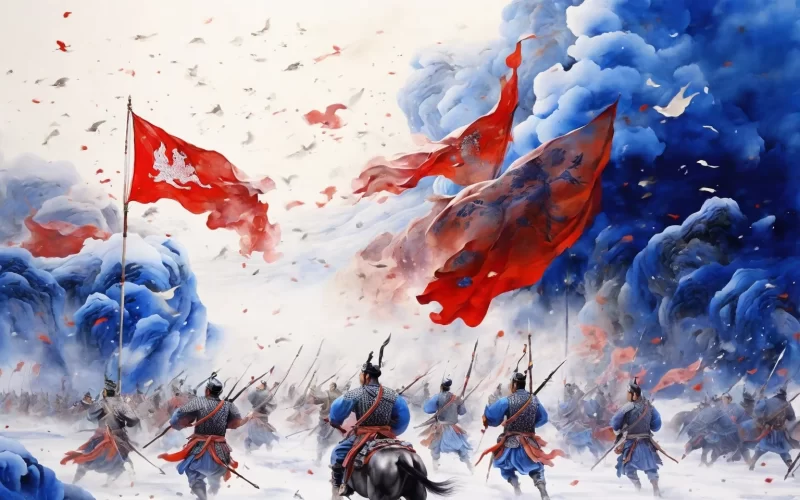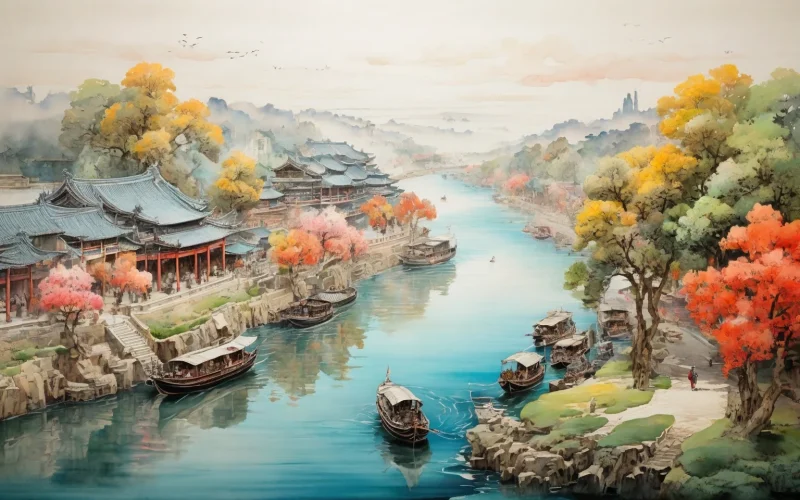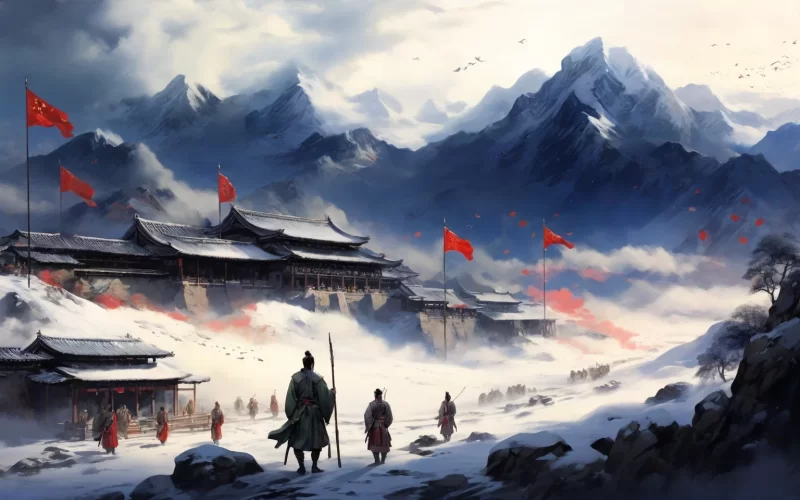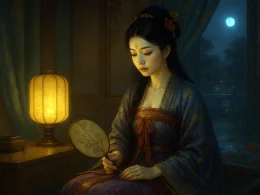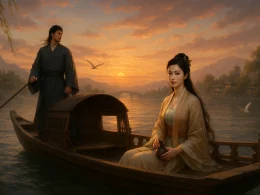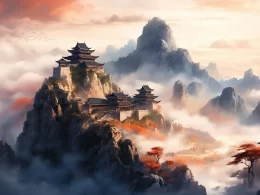The beacon fires spread to the capital;
My agitated mind can't be calmed down.
By royal order to leave palace hall;
Our armored steeds besiege the Dragon Town.
Darkening snow damages our banners red;
With the howling wind mingle our drumbeats.
I'd rather fight at a hundred men's head
Than pore over books without performing feats.
Original Poem
「从军行」
杨炯
烽火照西京,心中自不平。
牙璋辞凤阙,铁骑绕龙城。
雪暗凋旗画,风多杂鼓声。
宁为百夫长,胜作一书生。
Interpretation
"I Would Rather Fight" is a frontier poem by the Tang Dynasty poet Yang Jiong. Using the traditional title Song of the Army, the poem vividly portrays the passionate ambition of a scholar whoYang Jiong's "I Would Rather Fight" is a frontier poem composed during the Tiaolu and Yonglong eras of Emperor Gaozong's reign, when frequent invasions by Tibetans and Turks threatened the northwest borders. As one of the "Four Literary Eminences of Early Tang," Yang—though renowned for his writings—channels patriotic fervor in this work, transforming from scholar to soldier through forty characters of concentrated grandeur. The poem moves from mobilization to battlefield fury before culminating in a defining life choice, epitomizing the Tang spirit of literary men pursuing martial glory.
First Couplet: "烽火照西京,心中自不平。"
Fēnghuǒ zhào xījīng, xīnzhōng zì bùpíng.
Beacon fires ignite the western capital's sky—
My heart rebels against its quiet study.
The opening ignites with emergency: "beacon fires" (烽火) don't just alert but "ignite" (照) the very air over Chang'an, their glow exposing the poet's scholarly complacency. That "heart's rebellion" (心中自不平) thrums with the tension between ink and iron.
Second Couplet: "牙璋辞凤阙,铁骑绕龙城。"
Yá zhāng cí fèng què, tiě qí rào lóng chéng.
Jade talismans part from phoenix gates;
Steel cavalry coils round the dragon fortress.
Ceremony meets carnage. The "jade talismans" (牙璋)—tokens of imperial command—gleam against the "phoenix gates" (凤阙), symbols of courtly refinement abandoned for war. Below, the "coiling" (绕) cavalry enacts a serpentine siege, its metallic sheen (铁骑) crushing poetry's delicacy.
Third Couplet: "雪暗凋旗画,风多杂鼓声。"
Xuě àn diāo qí huà, fēng duō zá gǔ shēng.
Blizzards blanch banners' vibrant beasts;
Gale-torn drumbeats fracture the wind's howl.
The battlefield becomes a sensory maelstrom. Snow "blanches" (凋) heraldic designs—nature erasing human symbols—while war drums (鼓声) and wind duel in dissonance. This is war stripped of glamour: elemental, chaotic, visceral.
Fourth Couplet: "宁为百夫长,胜作一书生。"
Nìng wéi bǎifū zhǎng, shèng zuò yī shūshēng.
Better to lead a hundred men in blood and mud
Than grow old annotating dusty texts.
The climax delivers its manifesto. The "centurion" (百夫长), though lowly, embodies tangible honor—his authority measured in lives saved or spent. The "bookworm" (书生) withers in comparison, his words mere ghosts of action. This ultimate choice between library and legion hallmarks the Tang ideal: scholarship in service of empire.
Holistic Appreciation
This poem, through the lens of a scholar's gaze, captures both the reality of military campaigns and the ideals of its era. It distills the early Tang intellectuals' deep concern for their nation's fate and their aspirations to achieve glory, embodying the spirit of scholars turning warriors. Beyond vivid depictions of battlefield scenes, the work offers profound reflections on societal values. From the opening beacon fires to the closing war drums, each line shifts like a cinematic frame—its rhythm brisk, its emotional progression seamless yet powerful. As a frontier poem, it diverges from the typical heroic depictions of soldierly life, instead blending scholarly refinement with martial ambition to craft a unique heroic narrative.
Artistic Merits
Precision in Structure: The poem follows a four-couplet structure (introduction, development, transition, conclusion), respectively portraying beacon alerts, the general's departure, battlefield imagery, and a climactic moral choice. Despite its brevity, it forms a complete and impactful narrative arc.
Vivid Imagery: From "beacon fires" and "jade tally" to "Dragon City" and "snow-dimmed banners," each image is tightly woven into the frontier warfare theme, creating dynamic, layered visuals that heighten the poem's emotional resonance.
Passionate Tone: The poet's patriotic anxiety and enlistment resolve pulse throughout. The language is economical yet charged—particularly the resolute declaration in the final couplet, which stirs the reader's spirit.
Symbolic Contrast: Juxtapositions like "scholar" versus "centurion" and "battered flags" alongside "iron cavalry" crystallize abstract ideals into tangible reality, deepening the poem's philosophical weight.
Insights
This poem epitomizes the early Tang scholars' idealized ethos: rejecting mediocrity, embracing duty, and honoring tangible service to the nation. Amidst turmoil and crisis, these literati chose the battlefield—a courage that commands respect. For modern readers, it not only rekindles admiration for heroism but also urges us to shoulder responsibilities beyond comfort, to stand firm when country and community call. Joining the Army is both an authentic portrait of its era's intellectual fortitude and a timeless summons to valor across millennia.
Poem translator:
Xu Yuan-chong (许渊冲)
About the Poet:
Yang Jiong (杨炯), 650 - 692 AD, was a native of Shaanxi. He was a poet of the Tang Dynasty and one of the Four Heroes of the early Tang Dynasty. In 661 A.D., at the age of 11, Yang Jiong was cited as a child prodigy, and in 676 A.D., he was awarded the title of school scholar.






